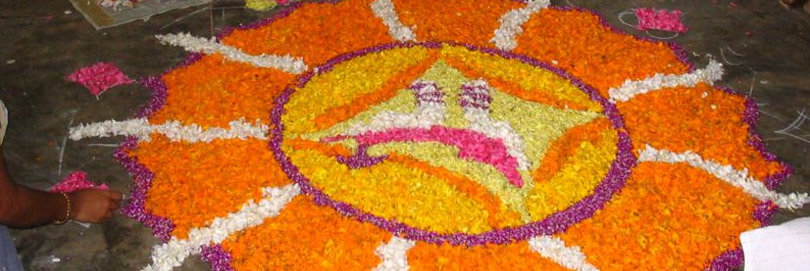
In the South, Diwali festival often commemorates the conquering of the Asura Naraka, a powerful king of Assam, who imprisoned tens of thousands of inhabitants. It was Krishna who finally subdued Naraka and freed the prisoners. Diwali Festival in the south is celebrated in the Tamil month of aipasi (thula month) ‘naraka chaturdasi’ thithi, preceding amavasai. The preparations begin the day before, when the oven is cleaned, smeared with lime, four or five kumkum dots are applied, and then it is filled with water for the next day’s oil bath. The house is washed and decorated with kolam (rangoli) patterns with kavi (red oxide). In the pooja room, betel leaves, betel nuts, plaintain fruits, flowers, sandal paste, kumkum, gingelly oil, turmeric powder, scented powder are kept. Crackers and new dresses are placed in a plate after smearing a little kumkum or sandal paste.
Celebrations
In The Morning: Deepavali celebrations begins early in the morning. The eldest family member applies sesame oil on the heads of all the family members. Then, it’s off for a bath, beginning with the youngest in the family. They emerge with new clothes and a look of anticipation at the thought of bursting crackers, which symbolizes the killing of the demon king Narakasur.
Lehiyan: But before that comes Lehiyan, the bitter concoction, to cleanse the system of its festive over-eating! Then to the crackers.
Murukku: A puja is performed for the family deities in the morning. Breakfast consists of murukku , a sweet dish and, of course, idli or dosa .
Wish fulfilment: Some communities believe that when Narakasur was to be killed, Lord Krishna asked him his last wish. Narakasura replied that he wanted to enjoy the last day of his life in a grand manner and Diwali was celebrated. That was the beginning and the practice continued.
In The Evening: In the evening, lamps are lighted and crackers are burst. As most of the cracker manufacturing units are in Tamil Nadu, there is no dearth of fireworks here.
During Thalai Deepavali, the newly weds go to the bride’s parental home for revelry. Taking blessings from the elders, they burst the first crackers of the day. Usually a vast range of crackers is bought, with costs running into thousands of rupees. The Diwali Celebrations include a visit to the temple, gifts of clothes and jewelry, gorging on sweets and receiving blessings of elders. The groom’s parents, brothers and sisters come down to join in the celebrations.
Source: httpss://www.diwalifestival.org/diwali-in-south-india.html






























